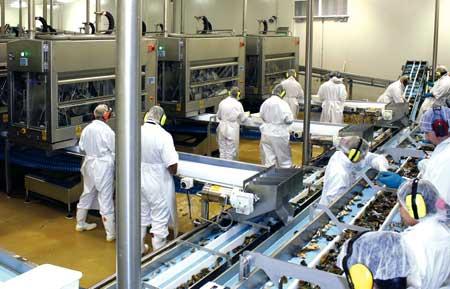|
A brand new $23 million mussel processing facility in Tauranga features ground-breaking technology developed here in New Zealand and patented in a number of countries.
North Island Mussel Processor’s (NIMPL’s) factory contains the world’s first automated mussel opening (AMO) machines –technology that will help the state-of-the-art ‘Greenshell’ mussel processing plant increase export manufacturing capacity nearly three-fold.
The AMO machine was developed specifically to open Marlborough and Coromandel mussels. Vibration and rollers are used to separate the mussels in front of a camera that determines which way the mussels are orientated (for opening). The machine then re-positions them correctly for opening. Vacuum cups are applied to both sides of the shell, allowing a knife to separate one side from the other (or produce a half-shell).
An average mussel opener will open 29 per minute – the AMO does 27 per minute. However, the AMO can operate 24 hours a day if required.
“Our new Tauranga factory houses 28 AMO machines processing more than 1.6 million mussels per 16 hour day,” explains NIMPL director Peter Vitasovich. “When fully operational, NIMPL will boast the world’s largest capacity for half-shell production.”
Once the mussels have been opened they are visually inspected prior to being frozen. NIMPL uses a spiral freezer with an integrated re-freeze section, another first for the New Zealand mussel industry. The freezer is a continuous spiral-belt freezer designed to minimise product weight loss and assure quality during the freezing process. Product is evenly fed from the production line directly onto the loading freezer belt, which transports the product into the low temperature freezing zone. The belt spirals up into the rotating drum until it reaches the top where the frozen product is gently discharged from the freezer discharge port.
Due to the large belt surface available, product in single layer is Individually Quick Frozen (IQF). Because product can maintain its original load-in position throughout the freezing process, it is easier to sort afterwards.
Once the half shell is snap frozen, the product is glazed with chilled water, re-frozen, then packed.
NIMPL utilises a new conveyer handling system (ROFLO3) which allows for gentler handling of the product. The system is typically used for biscuits and potato chips; however this is the first time it has been used in a full wash down environment.
The ROFLO3 system feeds by computer level control systems an even distribution to two of the latest Yamato computer controlled Multi Head Weighers (MHW).
Two Propac Vertical Form Fill (VFF) bag makers then receive weighed product from the Yamato’s. The filled formed bags are then presented to a metal detector check weigher combination system which senses pre-determined parameters for export requirements.
|
The processing facility also utilises cooking technology from Danish company Cabinplant – who custom-built a blancher adapted from the vegetable industry. This technology is more energy-efficient than traditional steam blanchers, as it uses counter current energy transfer – and meets the strictest hygiene standards.
NIMPL is a joint venture between Sanford Limited, Sealord Group Limited and Greenshell New Zealand Limited. NIMPL chairman Geoff Burgess describes the joint venture as an innovative model for export co-operation and rationalisation, saying NIMPL will contribute to the industry’s ambitious plan of making New Zealand’s aquaculture sector a sustainable billion dollar industry by 2025.
|






